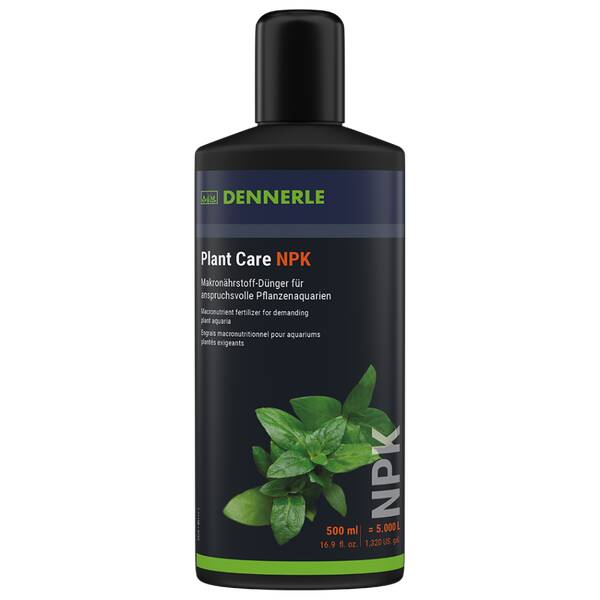Dennerle Plant Care NPK 500ml
SKU: 073093
DENNERLE
Macronutrient fertilizer for heavily planted aquariums with a low number of fish
With nitrates (NO3)
phosphate (PO4)
and potassium (K) plus magnesium (Mg)
For beautiful plants and bright bright colors
Immediate and long-term effect
Scientifically tested and optimized according to nature's example
...More
in stock 2
€24,00
€21,24
Add to cart
Dosage & Application
If you have measured and fertilized regularly for several weeks, you will see at which level the measured values settle and which macronutrient additions the aquarium needs. Then you can add the determined weekly dose of Plant Care NPK as standard and increase the measuring intervals to 2 to 4 weeks with a clear conscience. A good guideline is 10 ml / 100 L / week, which corresponds to an addition of 5 mg/L nitrate, 0.4 mg/L phosphate and 2.5 mg/L potassium. If the tap water used for water changes contains exceptionally high levels of nitrate (e.g. 50 mg/L) but hardly any phosphate, or high levels of phosphate (> 1 mg/L) but hardly any nitrate, then the use of Plant Care NPK is not recommended in order to avoid disadvantageously high levels of individual macronutrients and nutrient imbalances. In this case, Dennerle Plant Care N or Plant Care P single nutrient fertilizers should be used to specifically compensate for nutrient gaps. This is because, in addition to the absolute nutrient concentration, the nutrient ratios are also important. The nitrate-phosphate ratio should ideally be in the range of 10 : 1 to 15 : 1. If the tap water contains only small amounts of potassium (e.g. < 3 mg/L), Dennerle Plant Care K should be used. This is often the case with very soft water. The analysis values of your own tap water can be obtained from your local water supplier. They can be easily retrieved via the Internet. In addition, potassium is one of the few nutrients that only reach the aquarium in traces through the fish food. A macro-nutrient fertilizer must always be used in combination with a micro-nutrient fertilizer. For a complete supply of nutrients and best possible plant growth, we recommend the combination of Plant Care NPK with Plant Care Pro.
If you have measured and fertilized regularly for several weeks, you will see at which level the measured values settle and which macronutrient additions the aquarium needs. Then you can add the determined weekly dose of Plant Care NPK as standard and increase the measuring intervals to 2 to 4 weeks with a clear conscience. A good guideline is 10 ml / 100 L / week, which corresponds to an addition of 5 mg/L nitrate, 0.4 mg/L phosphate and 2.5 mg/L potassium. If the tap water used for water changes contains exceptionally high levels of nitrate (e.g. 50 mg/L) but hardly any phosphate, or high levels of phosphate (> 1 mg/L) but hardly any nitrate, then the use of Plant Care NPK is not recommended in order to avoid disadvantageously high levels of individual macronutrients and nutrient imbalances. In this case, Dennerle Plant Care N or Plant Care P single nutrient fertilizers should be used to specifically compensate for nutrient gaps. This is because, in addition to the absolute nutrient concentration, the nutrient ratios are also important. The nitrate-phosphate ratio should ideally be in the range of 10 : 1 to 15 : 1. If the tap water contains only small amounts of potassium (e.g. < 3 mg/L), Dennerle Plant Care K should be used. This is often the case with very soft water. The analysis values of your own tap water can be obtained from your local water supplier. They can be easily retrieved via the Internet. In addition, potassium is one of the few nutrients that only reach the aquarium in traces through the fish food. A macro-nutrient fertilizer must always be used in combination with a micro-nutrient fertilizer. For a complete supply of nutrients and best possible plant growth, we recommend the combination of Plant Care NPK with Plant Care Pro.
Reviews
No reviews yet


